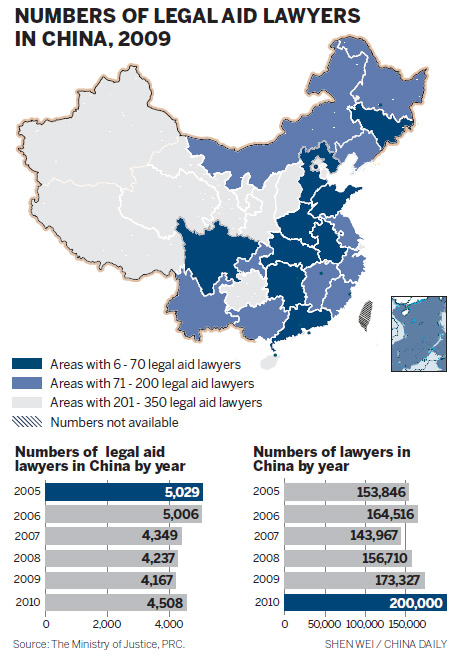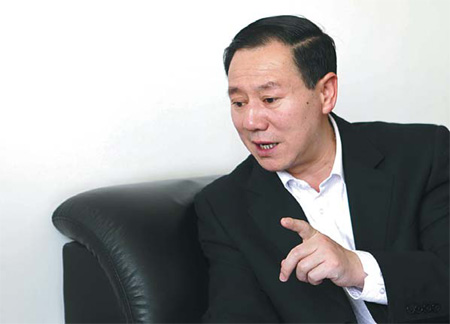Legal aid presents a case for the vulnerable
Updated: 2011-05-19 08:15
By Wang Yan (China Daily)
|
|||||||||||
Ma, who has been practicing law for nine years, was a business lawyer at a firm in her hometown of Beijing. She said she was excited to learn about the program last year so she took a leave of absence from her law firm.
"I don't think lawyers should serve only the rich. Coming here gives me a chance to realize my self-value." She spoke as she sat in her spartan second-floor office in Shandan, quite a change from her high-rise office in Beijing's central business district.

Ma said she feels needed in Shandan. Walking on the streets, she is easily recognized by the local people. A fruit-store owner said, "Hi, lawyer Ma. You are back."
"In their mind, I'm the lawyer from Beijing. I'm grateful for how they respect me."
During her term of nearly one year, Ma said she has had little time to travel, yet she has set her feet in every village in Shandan county for "evidence collection and legal training".
"The smaller the place is, the more it needs laws and law professionals," she said. "Nobody can promise that he or she will never get ill and will never need a doctor, and the reasoning also applies to legal aid. One never knows when he or she will have to deal with courts and lawyers."
Similar to Ma, 130 lawyers and 300 law school graduates have participated in the project so far. They handled 3,182 legal aid cases in 2010, a year-on-year increase of 52 percent.
Zhou Zhengbin, director of the Gansu Justice Department's legal aid office, said the province's justice officials understand the importance of keeping qualified law professionals. Forty-three of the 86 counties in the province are below the national poverty level.
Gansu has raised the stipend for legal aid lawyers from 200 to 1,200 yuan per case to 300 to 1,500 yuan. "The average is about 600 yuan," Zhou said.
Wang with the Justice Ministry compared the stipend to the average lawyer's income of about 3,000 yuan a case. "The legal aid lawyers have made a big sacrifice," he said.
'Part of charity'
 |
|
Zhou Zhengbin, director of the Gansu Justice Department's legal aid office, talks about the importance of keeping qualified law professionals in the region. Wang Jing / China Daily |
Legal aid in China has just passed its 16th birthday. The Ministry of Justice began to build the system in 1994, and in 2003 the State Council issued the Regulations of Legal Aid System, the guidelines to legal aid work in the country.
"The central government has increased its efforts in legal aid during recent years," said legal aid's Sun. "Last year, it allocated 100 million yuan to legal aid work, which doubles the amount in 2005. The majority of the money has gone to the western area.
"Last year, the total money coming from central and local governments was 900 million yuan. In 2009 it was 700 million."
A tiny portion of the money for legal aid came from public donations. But Zhou Yuansheng, general secretary of the Legal Aid Foundation, said public awareness is still low, given the short history of legal aid. Just 0.4 percent of the total in 2009 came from public donations. Numbers for 2010 will be released in June.
"From 1999, when the foundation was founded, to last year, I saw an average donation of 30 million yuan each year. Most of it was from large-scale State-owned companies."
Zhou said he hopes to generate more attention among the public to the service. "Legal aid is a part of charity. It's helping the poor."
His next step will be to launch a program to take legal aid to the village level, even more basic than the county level. "Farmers in the country are one of the neediest groups for legal aid. Without its development in the villages, legal aid cannot healthily develop all over the country."
Unattended children of migrant workers, orphans and empty nest elderly are the groups he focuses on.
"Volunteers and legal professionals, when coming down to the county and village levels, are not only for making presentations in court," Zhou said. "Another important part of their job is to mollify social contradictions," the kinds of problems that arise in China's fast-paced development.
In Gansu, for example, legal aid professionals provided free consultations to more than 120,000 people last year. In local officials' words, that service "has resolved many social contradictions."
Farmers, migrants
Zhou has targeted the right group, according to data from the Ministry of Justice. In 2009, farmers constituted the largest group that received legal aid, 33 percent. Migrant workers were second, at 32 percent.
Shi Fumao, a lawyer and executive director of the Beijing Zhicheng Migrant Workers' Legal Aid and Research Center, switched to legal aid in 2005.
"Our job is selling non-governmental services to the government. And I think migrant workers' legal aid is one of the most worthy areas."
Shi said he has seen a shift in migrant workers' needs. "Back in 2004 and 2005, the biggest demand was in asking for salaries. Since 2008, though, when the Labor Contract Law went into effect, the percentage has fallen to under 20 percent. Now more cases are about social security, overtime fees and labor relations."
The center has expanded quickly since its founding in 2005. Now there are 26 migrant worker legal aid centers nationwide, and more than 100 legal aid lawyers. Even so, the workload is daunting. Last year, Shi himself handled 178 cases.
"Most of the disadvantaged groups are gathered at the grass-roots level. How can we talk about harmony without solving their minor contradictions? One of the solutions is legal aid," he said.
Ma Lan is on Shi's side. The volunteer lawyer in Shandan county said she has applied for another year with the program.
"I'm heading to Tibet in July. I don't know what's waiting for me there, but I'm quite looking forward to it."











